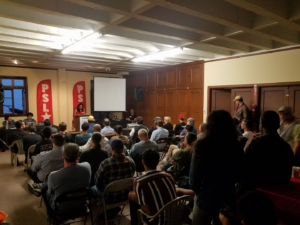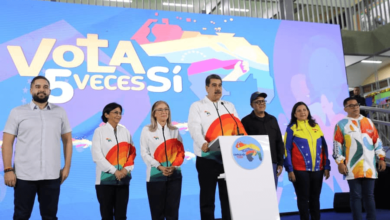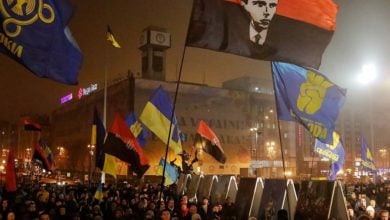 On June 2 the Party for Socialism and Liberation held a forum in Los Angeles featuring PSL member Mike Prysner who gave an eye-witness report on his recent trip to Venezuela. The event was a solidarity event supporting the Bolivarian Revolution against the attacks by the Venezuelan right wing—attacks which have included racist self-proclaimed lynchings carried out by ultra-rightist elements of the Venezuelan opposition.
On June 2 the Party for Socialism and Liberation held a forum in Los Angeles featuring PSL member Mike Prysner who gave an eye-witness report on his recent trip to Venezuela. The event was a solidarity event supporting the Bolivarian Revolution against the attacks by the Venezuelan right wing—attacks which have included racist self-proclaimed lynchings carried out by ultra-rightist elements of the Venezuelan opposition.
Prysner and Abby Martin of TeleSur’s The Empire Files recently visited Venezuela to gather research and interviews for the show, which Prysner produces. Since that trip, both have been receiving death threats from the rightwing opposition, which has composed a whole saga of rumors, slanders and outright lies about Martin and Prysner. Despite a complete lack of evidence of any sort, the main slander is that Martin and Prysner are paid employees of the Venezuelan National Guard (GNB) tasked with infiltrating and reporting on the opposition to the Venezuelan authorities.
Jose Vicente Carrasquero Aumaitre, a professor of political science in Venezuela and a prominent rightist, was the first to make the accusation, claiming on Twitter that Martin and Prysner “infiltrate opposition protests in order to collect intelligence for the GNB.” American journalist Angie Perez picked up the slander and did her part to popularize it in the United States.
As a result of the death threats, PSL took active security measures to protect the forum’s attendees and speakers, as well as our members.
As early as 5:00pm—more than two hours before the event was scheduled to start—Venezuelan emigres began to arrive requesting entry into the venue, posing not as members of the opposition but as supporters of the Bolivarian Revolution. Thanks to the advance work by PSL members working on event security, many of those who sought to disrupt the meeting were identified in advance and denied entry. The opposition responded by claiming we were having “a meeting about Venezuela without Venezuelans,” even as they watched several Venezuelans who were not part of the opposition rally enter. Although these Venezuelan attendees were themselves not supporters of the Bolivarian Revolution, they expressed upfront that they were curious, interested in dialogue and gave constructive public comments during the discussion.
Meanwhile, a crowd of opposition supporters began gathering outside. Soon after mustering, the opposition realized their efforts to lie their way into the event would not be successful, and they became increasingly threatening and abusive. One had Facebook-stalked and threateningly bandied knowledge of PSL members’ names while holding a GoPro camera to their faces. Another began banging against the gate of the church in which the event was held.
After about an hour and a half of protesting outside, the opposition hardened its tactics even further, attempting to force entry by attempting to hold the door open as PSL members admitted attendee —presumably in an attempt to rush inside. Several made attempts to break into the event by seeking out unguarded entrances to the church. Opposition protestors began throwing lit cigarettes at security teams. Some began hitting the church’s call-in box while yelling slurs at PSL members.
Despite the opposition protesters’ best efforts, no disruptions were carried out inside, no attendees or PSL members were harmed, nor were their cars or other belongings vandalized.
Who are the Venezuelan opposition in the United States?
Following almost every move by the leaders of the Bolivarian Revolution is an opposition movement inside and outside of Venezuela. Inside of Venezuela, their activities range from hoarding and other forms of economic sabotage, to riots targeting hospitals, low-income housing and other developments and symbols originating from the Bolivarian Revolution. The best-known example of this were the riots following the electoral failure of Herique Capriles in the 2013 presidential election.
In the United States, there is a sizable Venezuelan émigré community which assumed its present form in the years since Hugo Chavez became President of Venezuela in 1998. They are dominated by the old Venezuelan political and economic elite, whose power came under threat by Chavez and Maduro’s leadership.
Of course, there are many different elements within the Venezuelan-American community, but it requires little explanation why the elements who have become the darlings of the U.S. corporate media and of the Washington politicians are the most right-wing elements of that community. Likewise, it is obvious why those same elements are so often on display attacking the solidarity movement in the United States.
Though the opposition’s presentation relies on tired references to democracy and freedom —watch-words of Cold War anti-communism — their participation in economic sabotage and collusion with the United States expose their true character and intentions. They desire the overthrow of the legitimate government of Venezuela and a return to the Venezuela ruled by oil barons and other oligarchs.
Put plainly, the opposition’s politics are anchored by anti-communism, not anti-repression. That reality was on clear display June 2 when opposition protest chanted “Maduro, go back to Cuba,” as they came to harass, intimidate and assault attendees for the meeting.
Thanks to organization, political leadership, preparation and experience, however, the event was a success. Not only were no attendees harmed, but the event swelled to completely fill out the venue. The standing-room-only event stood in stark contrast to the violent mob which had congregated outside, both in its demeanor and its size.
According to Prysner, “Here we have a challenge: preventing the United States from destroying yet another sovereign, independent country that had the guts to stand up and say: ‘This country is ours. It doesn’t belong to foreign powers.'”






